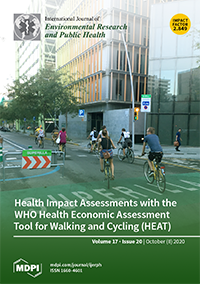The story of HEAT continues
 The latest developments of the World Health Organisation 'HEAT' tool provide the cover story for a new publication in the International Journal of Environmental Research and Public Health. Over the past 8 years, the Transport Studies Unit's Christian Brand has helped develop the tool, which quantifies the health and carbon benefits of walking and cycling, and is used by local and national governments across the globe.
The latest developments of the World Health Organisation 'HEAT' tool provide the cover story for a new publication in the International Journal of Environmental Research and Public Health. Over the past 8 years, the Transport Studies Unit's Christian Brand has helped develop the tool, which quantifies the health and carbon benefits of walking and cycling, and is used by local and national governments across the globe.
HEAT (Health Economic Assessment Tool for walking and cycling) provides a simple way to assess benefits from physical activity, as well as risks from exposure to air pollution and traffic crashes resulting from active travel modes. The online tool calculates impacts on carbon emissions from displaced motorised travel. HEAT aims at an audience of planners, policymakers and researchers alike who wish to derive ballpark estimates of the impacts of sustainable transport measures and policies, based on simple data inputs, without investing an overwhelming amount of time, and without the requirement of in-depth knowledge of the underlying travel behaviour and health science or impact assessment methodologies.
Open access publication: Götschi, T.; Kahlmeier, S.; Castro, A.; Brand, C.; Cavill, N.; Kelly, P.; Lieb, C.; Rojas-Rueda, D.; Woodcock, J.; Racioppi, F. (2020) Integrated Impact Assessment of Active Travel: Expanding the Scope of the Health Economic Assessment Tool (HEAT) for Walking and Cycling. Int. J. Environ. Res. Public Health, 17, 7361.
Find out more in our Spotlight on Research feature.
The story of HEAT continues
The latest developments of the World Health Organisation 'HEAT' tool provide the cover story for a new publication in the International Journal of Environmental Research and Public Health. Over the past 8 years, the TSU's Christian Brand has helped develop the tool, which quantifies the health and carbon benefits of walking and cycling, and is used by local and national governments across the globe.

